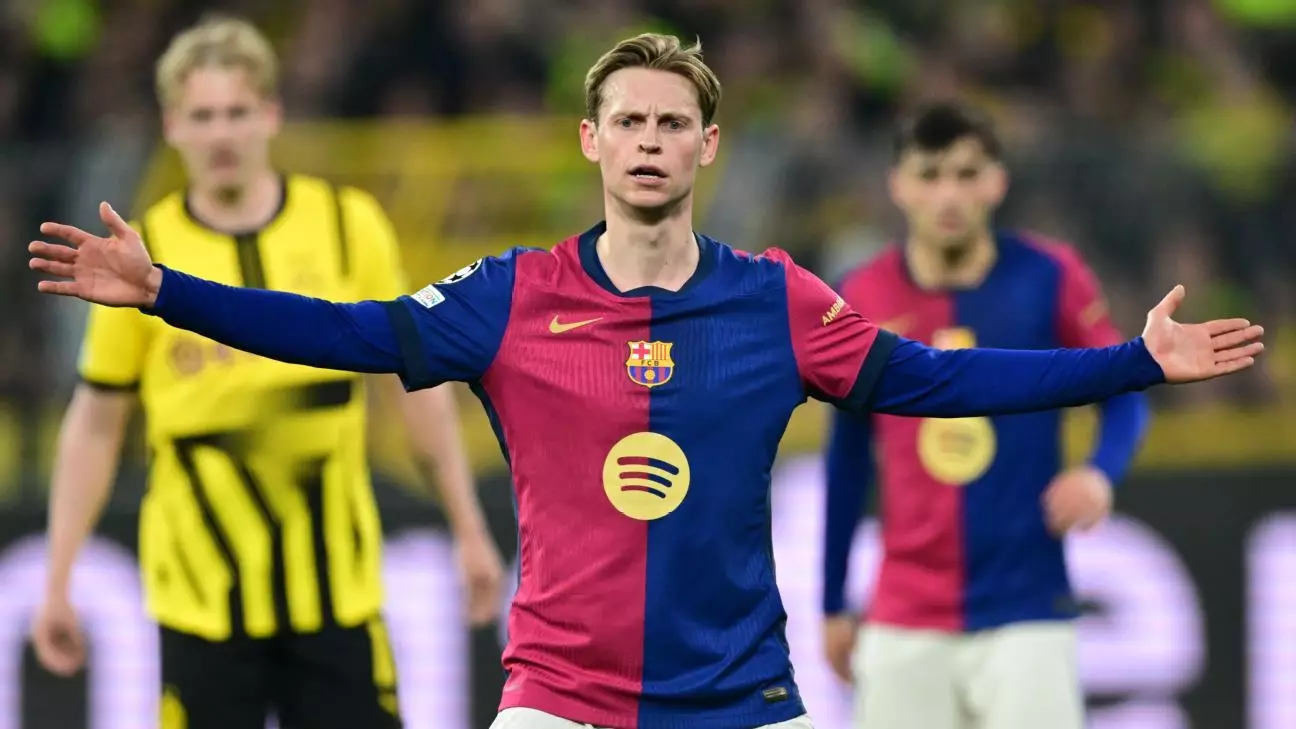As Barcelona emerged from a challenging UEFA Champions League encounter with Borussia Dortmund, the mood within the team juxtaposed incongruously against the triumph of qualification for their first semifinal since 2019. There was little exuberance from the players, who had to grapple with the reality of a painful 3-1 defeat on the night, despite advancing with a 5-3 aggregate scoreline. Borussia’s Serhou Guirassy, the night’s standout performer, demonstrated a remarkable knack for goalscoring but ultimately could not dethrone a side that had laid the groundwork in the first leg with a resounding 4-0 win.
The ties had started favorably for Barcelona, with optimism bubbling ahead of the second leg. However, the discordant echoes of past European failures began creeping in as Dortmund relentlessly pressed, drawing the visitors into a game that felt increasingly precarious. Despite ample breathing room thanks to their earlier success, Barcelona’s performance is indicative of the fragile mentality that can sometimes afflict great clubs—a stark reminder that victories can be as psychologically taxing as defeats.
Breaching the Psychological Barrier
Dortmund’s raucous atmosphere added to the daunting task of consolidating their aggregate lead. Barcelona, fielding a patched-up side missing key players like Alejandro Balde and with others resting, became vulnerable. Their early anxiety was palpable as defensive frailties were exposed, illustrating an unsettling trend for a team that had struggled to find consistency in European competition.
Guirassy’s penalty and subsequent goals unveiled cracks in Barcelona’s armor, raising questions about their defensive discipline under pressure. Aiming to draw lessons from their past, where they faltered spectacularly against teams like AS Roma and Liverpool, the tension in Barcelona’s camp felt weighted. Their inability to dominate the game—recording an expected goals (xG) statistic of merely 0.02 at halftime—suggested a team still inconsistent in mindset, oscillating between brilliance and uncertainty.
Younger Faces and Emerging Leaders
Coach Hansi Flick tried to emphasize the positives amidst the unease in the dressing room after the match. The youthful composition of the squad—while brimming with talent—is also plagued by inexperience. With heavy expectations following a challenging previous season devoid of trophies, doubts have begun to intermingle with early-season elation. Players like Raphinha and Robert Lewandowski have dazzled at times, collectively contributing an impressive 82 goals this season, but consistency in high-pressure scenarios may prove to be a different beast altogether.
In the face of such tumult, the mental capacity of the squad will be further tested in the upcoming fixtures, including a pivotal Copa del Rey final against Real Madrid and potentially facing powerhouse clubs like Bayern Munich or Inter Milan. Barcelona’s ambition cannot afford to lose momentum, and yet, upon witnessing the vulnerability displayed in Dortmund, apprehensions persist about their readiness for the trials ahead.
Fan Enthusiasm and Club Identity
Signs proclaiming that “Barcelona is back” filled the stands, a reflection of an ever-hopeful fanbase desperate to embrace a return to the upper echelons of football. However, the muted celebrations post-match suggested that everyone involved—players, staff, and supporters alike—are acutely aware that past laurels do not define the present. The prevalent atmosphere at Signal Iduna Park revealed more than just an emotional response to the result; it captured the dichotomy of hope and anxiety that surrounds the club’s complex journey back to the pinnacle of European football.
This contrast struck a chord with defender Jules Koundé, who openly acknowledged the subpar display, a sentiment echoed by his teammates’ charged discussions as they debriefed. It was evident that beneath the surface of achieving their objective, there loomed the ambitious aspirations of a club intent on restoring its reputation and reclaiming its place among Europe’s elite.
Embracing Challenges as Catalysts for Growth
The dynamic between expectation and performance at Barcelona will only intensify moving forward. While the club celebrates reaching the semifinal stage, it must reconcile the need for improvement evidenced by their recent performances, which do not align with the ambitions dictated by history. Flick’s optimism, though warranted, needs to be tempered by realism—the inevitable reckoning that comes when one strives for greatness.
In this critical juncture of Barcelona’s season, it’s crucial to ponder whether the ominous reflection of past failures will haunt them further or become an influential motivation that fuels their resolve. Supported by a loyal following and buoyed by sporadic brilliance, the path ahead will rigorously test the mettle and adaptability of this ambitious young side, setting the stage for a potential resurgence that may once again elevate them on the grandest European stage.

